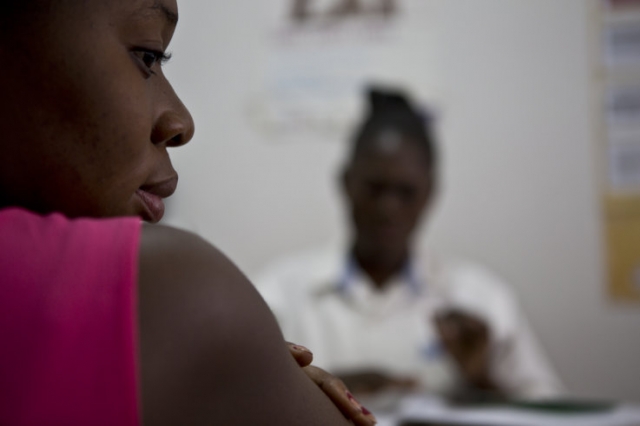Implementing cervical cancer interventions key to save African women
 Brazzaville, 13 April 2015 - Cervical cancer continues to be a significant threat and demands urgent attention in the African Region. Cervical cancer is the most common of all cancers in Africa and affects the lower part of a woman’s womb. In 2012, over half a million new cases of cervical cancer were diagnosed worldwide with 1 in 5 being in sub-Saharan Africa.
Brazzaville, 13 April 2015 - Cervical cancer continues to be a significant threat and demands urgent attention in the African Region. Cervical cancer is the most common of all cancers in Africa and affects the lower part of a woman’s womb. In 2012, over half a million new cases of cervical cancer were diagnosed worldwide with 1 in 5 being in sub-Saharan Africa.
Most women in the African Region do not receive timely diagnosis or have access to treatments that could cure or prolong their lives. If these challenges are not addressed, cervical cancer deaths are projected to rise by almost 25% over the next 10 years.
“Women who die from cervical cancer are in the prime of their lives. These deaths are unnecessary because there is compelling evidence that cervical cancer is one of the most preventable and treatable forms of cancer if it is detected early and managed effectively,” said Dr Matshidiso Moeti, WHO Regional Director for Africa.
The primary cause of cervical pre-cancer and cancer is persistent or chronic infection with one or more types of the high risk human papillomavirus (HPV). HPV is the most common sexually acquired infection and it is most often acquired in adolescence and young adults upon sexual debut.
The two high-risk HPV types that most commonly cause cervical cancer are types 16 and 18, which together are responsible for approximately 70% of cervical cancer cases. Women living with HIV are more likely to develop persistent HPV infections at an earlier age which in turn leads to premature development of life-threatening cancer.
Released in December 2014, The Comprehensive cervical cancer control: a guide to essential practice provides a comprehensive approach to cervical cancer prevention and control. In particular, the new guideline highlights complementary strategies that will lead countries’ health services to achieve broad cervical cancer prevention and control coverage, and emphasizes the need for collaboration across programmes, organizations and partners.
Two vaccines that prevent infections from high-risk HPV types 16 and 18 are presently licensed in most countries and they have excellent safety records. The recommendation is to vaccinate young girls between the ages of 9 to 13 years before they are sexually exposed to HPV.
Routine screening of apparently healthy women to detect pre-cancer and early cancer as well as providing treatment for these will prevent the development of cervical cancer. There are options for providing services for screening and treatment of precancerous lesions. Visual inspection of the cervix with acetic acid (VIA) followed by treatment with cryotherapy for women with pre-cancer have been shown to be a cost-effective strategy in resource limited settings.
Other important considerations in cervical cancer prevention and control interventions are the social determinants of health, such as wealth, education, religion and ethnicity. Stakeholders are also seeking to better understand gender equality challenges and take them into account when designing and implementing health policies and programmes for cervical cancer.
Integrating cervical cancer prevention and control strategies into existing health systems and improving access to health care services will contribute immensely towards addressing the problem of cervical cancer in the Region.
To reduce the burden of cervical cancer, the World Health Organization (WHO) in collaboration with the U.S. Centers for Disease Control (CDC) and the Bill & Melinda Gates Foundation (BMGF) is hosting a cervical cancer experts’ meeting from 13 to 15 April 2015 in Brazzaville Congo. The meeting will focus on implementing cervical cancer prevention and control interventions in the Region.
Comprehensive Cervical Cancer Control: a guide to essential practice
______________________________________
For more information, please contact:
Technical contacts:
Dr Steven Shongwe; Tel: +472 413 9240; Email: shongwes [at] who.int (shongwes[at]who[dot]int)
Dr Prebo Barango; Tel: +472 413 8033; Email: barangop [at] who.int (barangop[at]who[dot]int)
Media contacts:
Dr Cory Couillard; Tel: + 472 413 9995; Email: couillardc [at] who.int (couillardc[at]who[dot]int)
Mr Collins Boakye-Agyemang; Tel: + 472 413 9420; Email: boakyeagyemangc [at] who.int (boakyeagyemangc[at]who[dot]int)


